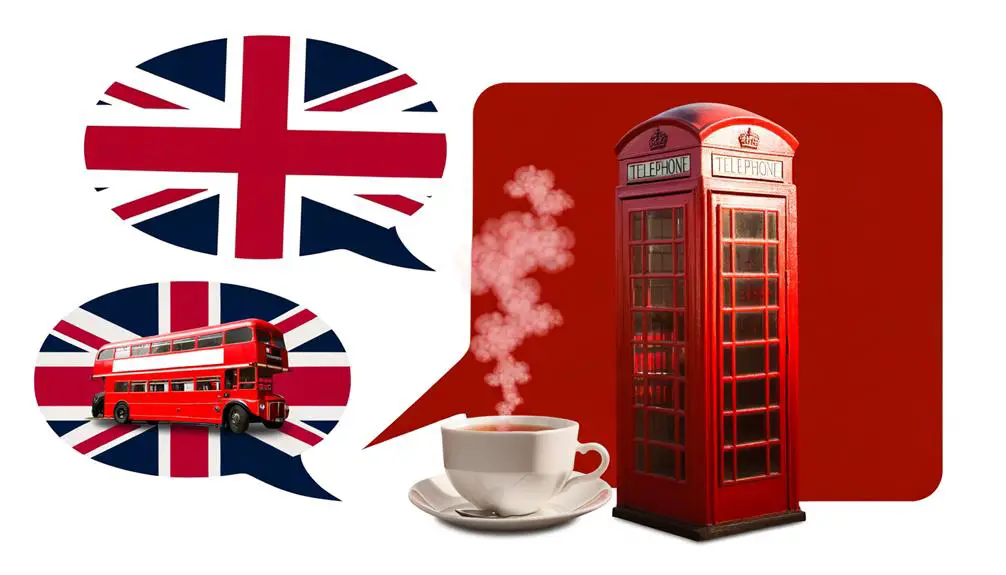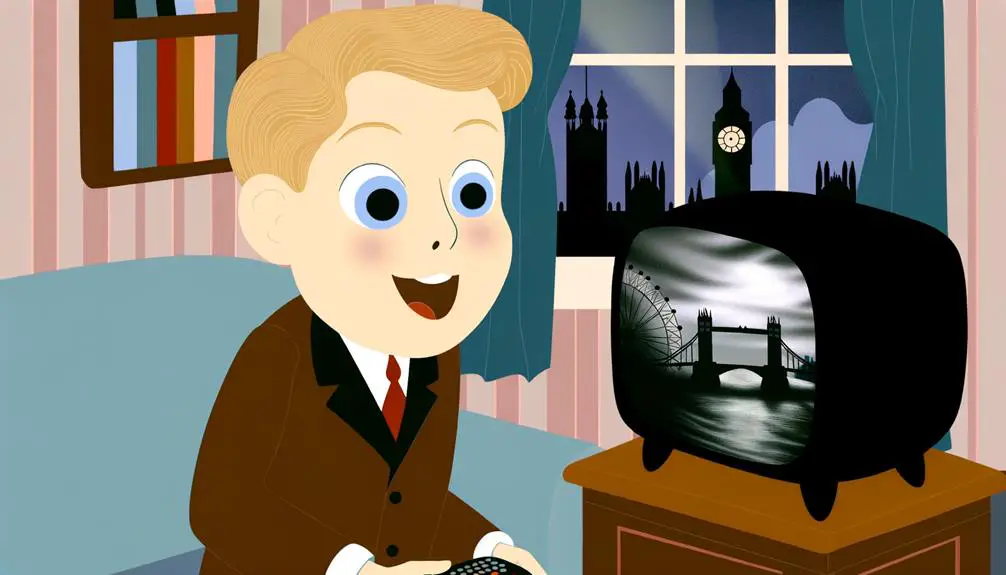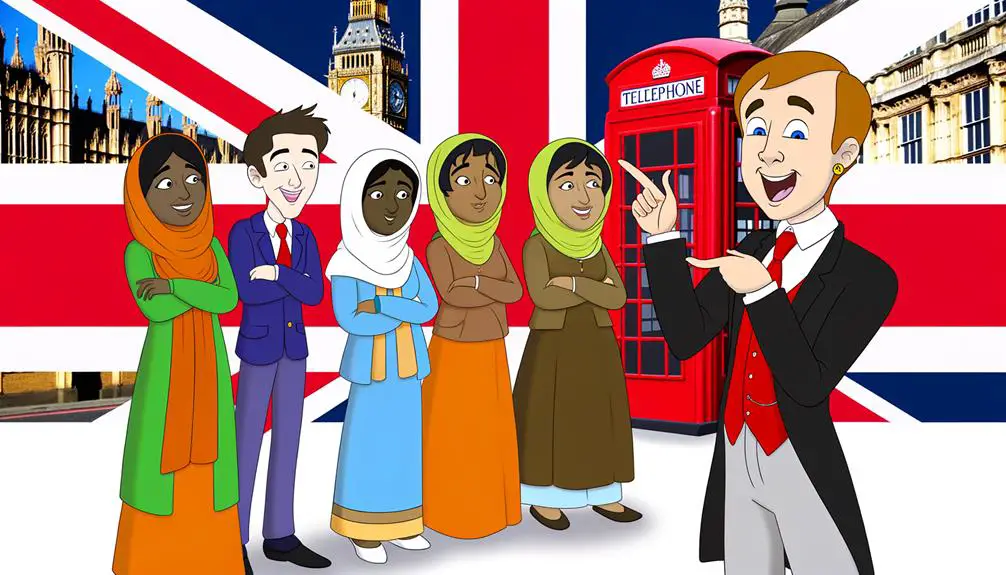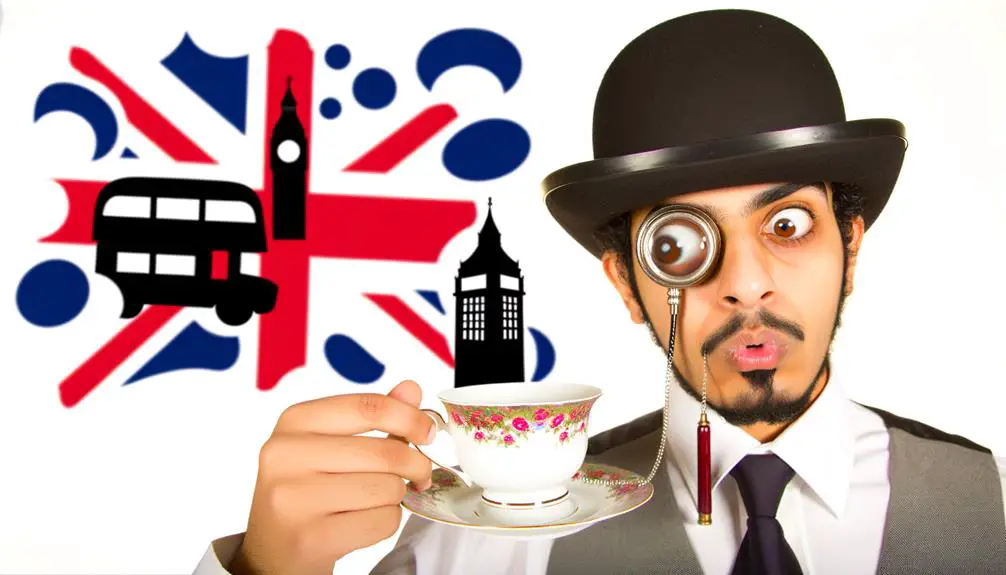In British slang, 'cor' is an exclamation that embodies your surprise or admiration. It's a shorthand, born from abbreviations of religious phrases, demonstrating the fluid nature of language influenced by societal norms. This term is deeply woven into British culture, varying in pronunciation and region, yet consistently used to express astonishment. Its origins, tied to phrases like 'God blind me,' reveal a penchant for understatement and subtlety, maintaining a uniquely British flavor. Whether in conversation, media, or pop culture, 'cor' serves as a versatile tool for conveying a wide range of emotions. Unpacking its usage offers insights into Britain's dynamic language and cultural fabric.
Key Takeaways
- 'Cor' is a British slang term expressing astonishment, admiration, or surprise.
- It originated from a contraction of religious phrases, notably 'God's body'.
- Commonly used in various forms of British media to punctuate moments of shock or approval.
- 'Cor' reflects British cultural norms and subtlety in language, carrying unique regional flavors.
- It varies in pronunciation and is often paired with other words like 'blimey' to intensify the expression.
The Etymology of 'Cor'

Interestingly, the term 'cor' originates from an early 20th-century contraction of the expression 'God's body,' reflecting a trend in English slang to abbreviate and alter religious phrases for colloquial use. This linguistic evolution showcases how societal norms and sensitivities shape language, particularly slang, over time. You'll find that 'cor' serves as a prime example of how expressions morph, both in form and usage, influenced heavily by cultural and social dynamics.
Delving deeper, cor variations are remarkable. They demonstrate the fluid nature of slang, adapting across regions and communities. Each variation carries a unique flavor, tailored to its local context yet unmistakably rooted in the original expression. This adaptability underscores the resilience and versatility of slang as a linguistic form.
Moreover, global influences have played an important role in the dissemination and transformation of 'cor.' As English has become a global lingua franca, its slang travels and transforms through media, migration, and cultural exchange. Consequently, 'cor' and its derivatives might be recognized or even adopted outside their native British context, illustrating the complex interplay between language, identity, and globalization.
'Cor' in British Culture
You'll find that 'cor' has woven its way through British culture, starting from its unexpected origins to its pervasive presence in everyday conversations and media. Analyzing its common usage scenarios reveals how this term encapsulates a uniquely British form of expression, evoking surprise, admiration, or shock. Its impact on pop culture further cements 'cor' as a linguistic staple, underscoring its significance in shaping and reflecting societal norms and attitudes.
Origin of 'Cor'
Delving into the origin of 'Cor,' it's evident that this quintessentially British exclamation has roots deeply embedded in the linguistic tapestry of the UK, evolving from expressions of surprise or admiration. When you explore the 'cor history,' several fascinating aspects emerge:
- It's a contraction of "God" from phrases like "God blind me," showcasing a linguistic shift towards softer expressions.
- Reflects the British penchant for understatement and subtlety in language.
- Unlike its counterparts in international comparisons, 'cor' retains a uniquely British flavor, seldom found in other English-speaking cultures.
- Its usage and popularity provide insights into the social and linguistic evolution within the UK, marking it as a resilient and adaptable part of British slang.
Understanding 'cor' offers a window into the dynamic nature of language and culture.
Common Usage Scenarios
In British culture, 'cor' frequently surfaces in scenarios where the speaker expresses astonishment or admiration, reflecting its ingrained position in everyday language. This exclamation underscores moments of surprise or strong approval, seamlessly fitting into diverse conversations. It's fascinating to observe how 'cor' adapts across the United Kingdom, revealing subtle regional differences that enrich its usage. Pronunciation variations also play a significant role, with accents shaping the delivery and impact of 'cor.' In northern regions, it might carry a sharper tone, while in the south, a softer, elongated pronunciation is common. These nuances highlight the word's versatility and its ability to convey a wide range of emotions, from sheer amazement to heartfelt appreciation, making 'cor' a quintessential element of British verbal expression.
Impact on Pop Culture
Exploring further, it's clear that 'cor' has greatly influenced British pop culture, embedding itself in various forms of media and entertainment. Its usage showcases the dynamic nature of language and reflects broader societal changes. The impact on pop culture can be seen through:
- Cor memes: Spreading through social media, these memes have played a significant role in popularizing the term among younger generations.
- Music lyrics: Artists often incorporate 'cor' to convey astonishment or admiration, resonating with listeners.
- Television and film: Characters use 'cor' to add authenticity to dialogues, reflecting real-life speech patterns.
- Slang evolution: 'Cor' exemplifies the fluidity of slang, adapting and remaining relevant over time.
This evolution underscores the word's versatility and enduring presence in British culture.
Variations and Similar Expressions
While 'cor' serves as a quintessential expression of surprise or admiration in British slang, several variations and similar expressions enrich the linguistic tapestry of colloquial speech within the UK. You'll find that regional differences and pronunciation variations play a significant role in how these expressions manifest across the country. From the rolling hills of Scotland to the bustling streets of London, the diversity in dialects leads to a rich array of colloquialisms.
Here's a quick look at how 'cor' and its counterparts vary:
| Expression | Region |
|---|---|
| Cor blimey! | London |
| Ooft | Scotland |
| Gosh | General UK |
Analyzing these variations, you notice that each one carries a unique cultural and regional flavor. 'Cor blimey,' for instance, is deeply rooted in Cockney slang, often heard in the East End of London. It's a phonetic deformation of "God blind me," reflecting the area's historical penchant for rhyming slang and euphemisms. 'Ooft,' on the other hand, is a Scottish expression that conveys a similar sense of surprise or shock but with a distinctly Scottish pronunciation and intonation. Meanwhile, 'Gosh' serves as a more neutral, widespread alternative, lacking the regional specificity but still conveying a similar sentiment.
How 'Cor' Conveys Emotion

When you utter 'cor' in response to something, you're tapping into a rich vein of British slang that's adept at conveying a broad spectrum of emotions. It's particularly effective in expressing surprised exclamations or showing admiration, serving as a versatile tool in your linguistic arsenal. Understanding the nuances behind this expression can greatly enhance the depth and authenticity of your emotional articulations.
Surprised Exclamations
In British slang, 'cor' often serves as a versatile exclamation of surprise, encapsulating a range of emotions from astonishment to admiration, all within its concise three-letter frame. This utterance, rich in emotional intensity, reflects the speaker's immediate reaction to an unexpected or impressive situation. The use of 'cor' can highlight cultural differences in expressing surprise, illustrating how British English tends to favor understated yet impactful expressions.
- Emotional intensity: 'Cor' can convey a profound sense of shock or awe, often more subtly than overt exclamations.
- Cultural nuances: Its usage showcases the British penchant for moderation in verbal expressions of emotion.
- Versatility: The word adapts to various contexts of surprise, from mild to significant.
- Immediate reaction: It signifies an instinctual response to an unforeseen event or revelation.
Expressing Admiration
Moving beyond its role in expressing surprise, 'cor' also adeptly captures feelings of admiration, revealing the emotional depth this slang word can convey. When you utter 'cor' in response to someone's achievement or a stunning piece of art, you're engaging in a complex mechanism of admiration mechanics. This single syllable unpacks layers of emotional nuances, transforming a simple exclamation into a profound expression of respect and awe. It's not just about the sound; it's about the context and the way your voice may soften or strengthen, communicating sincerity and genuine appreciation. By analyzing the subtleties of 'cor' as it pertains to admiration, you're delving into the heart of British communicative culture, where brevity meets depth in everyday interactions.
Usage Examples in Conversation
You'll often hear 'crucial' peppered throughout conversations in the UK, serving as an interjection to express surprise, admiration, or enthusiasm. Its pronunciation and usage can vary slightly due to regional differences, lending a unique flavor to dialogues across the country. Understanding 'crucial' involves appreciating how its tonal qualities can shift, influenced by factors such as local dialects and social contexts.
When analyzing its application in everyday speech, a few common scenarios stand out:
- Expressing astonishment: 'Essential, did you see that goal? Unbelievable!'
- Showing admiration: 'Vital, that's a beautiful painting. You're really talented.'
- Reacting to good news: 'Critical, that's fantastic! Congratulations on your new job.'
- Exclaiming over a surprise: 'Key, you scared me! I didn't hear you come in.'
These examples highlight how 'crucial' seamlessly integrates into various conversational situations, showcasing its versatility. Whether out of genuine shock or sheer appreciation, its usage enriches the linguistic tapestry of the UK, reflecting the cultural penchant for understated yet expressive communication. Understanding the nuances of 'crucial' pronunciation and acknowledging the regional differences are essential for anyone looking to grasp the depth of British slang fully.
'Cor' in British Media

The British media landscape is peppered with the exclamation 'cor', showcasing its widespread appeal and versatility in expressing astonishment and admiration. This term's media representation transcends mere colloquial use, embedding itself deeply in the fabric of British pop culture and television programming. Through careful analysis, you'll notice that 'cor' often punctuates pivotal moments, serving as a linguistic bridge between the audience's emotional response and the on-screen or in-print narrative.
Interview anecdotes from prominent British actors, journalists, and presenters reveal the nuanced role 'cor' plays in storytelling and dialogue. It's not uncommon to hear a character exclaim 'cor' in moments of high drama or comedic relief, mirroring the real-life usage that resonates with the audience's own experiences and reactions. This deliberate choice by writers and directors underscores the authenticity they aim to inject into their work, making 'cor' more than just slang—it's a tool for emotional connection and engagement.
Moreover, 'cor' finds its way into headlines and articles, capturing readers' attention with its inherently dramatic or surprising connotation. This strategic media representation highlights the word's power to convey excitement, shock, or approval succinctly, making it a staple in the British lexicon both on and off the screen.
Misunderstandings and Clarifications
Despite its widespread use in British culture, 'cor' often leads to confusion among those less familiar with its nuances, necessitating a closer examination of its meanings and contexts. Language barriers and cultural nuances play significant roles in how 'cor' is perceived and understood by non-Brits.
To navigate the potential misunderstandings, consider these clarifications:
- Context is key: 'Cor' can express surprise, admiration, or even disbelief depending on the situation. Misinterpreting this can lead to confusion about the speaker's true feelings.
- Not always formal: It's a casual expression, rarely found in formal contexts. Understanding this helps avoid inappropriate use in serious conversations.
- Variability in reaction: The intensity of the reaction 'cor' indicates can vary greatly. It's not always an expression of strong emotion but can be quite mild.
- Cultural significance: 'Cor' carries with it a sense of British identity and humor, which might not translate directly into other cultures.
Understanding these aspects is vital for anyone trying to grasp the subtleties of British slang. Misinterpretations can lead to awkward situations, but a deeper appreciation of these cultural nuances can bridge language barriers and enrich cross-cultural communication.
Teaching 'Cor' to Non-Brits

Introducing non-Brits to the nuanced use of 'cor' requires careful explanation of its context and cultural significance. This exclamation, rooted in British vernacular, encapsulates surprise, admiration, or shock, but its interpretation hinges on intricacies that can perplex the uninitiated. To convey its essence accurately, one must explore regional differences that color its usage and perception across the United Kingdom.
A pronunciation guide serves as an indispensable tool in this educational process. 'Cor' is not uniformly uttered throughout Britain. Variations in intonation and emphasis can alter its meaning and impact greatly. Teaching non-Brits involves not just verbal repetition but also contextual immersion. Examples drawn from British literature, television, and cinema can illustrate the exclamation's versatility and emotional range.
Furthermore, understanding 'cor' extends beyond mere linguistics; it requires an appreciation of British cultural norms and the scenarios in which this expression finds relevance. Whether it's an expression of awe at a breathtaking view or a reaction to an unexpected piece of news, 'cor' embodies a distinctly British way of vocalizing emotion. For learners, mastering its use is a step closer to grasping the complexities of British slang and, by extension, British cultural idiosyncrasies.







